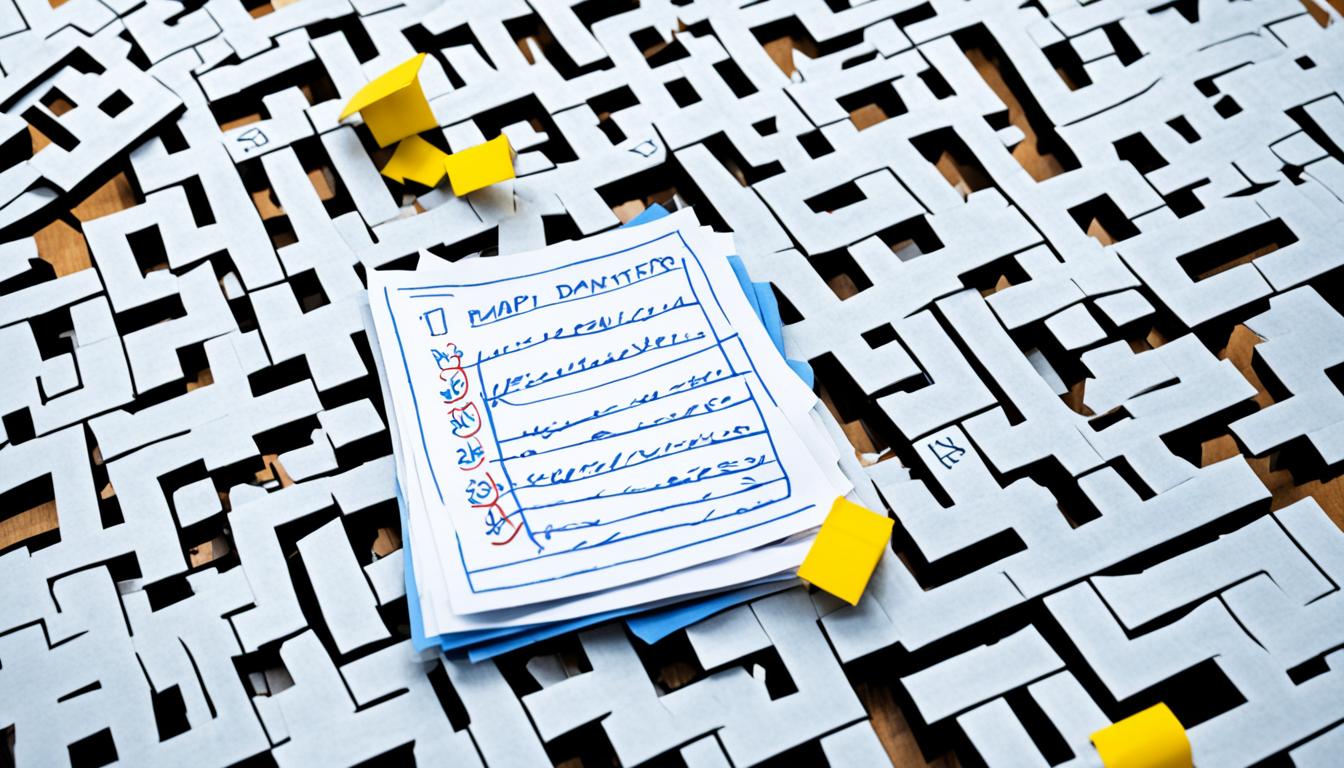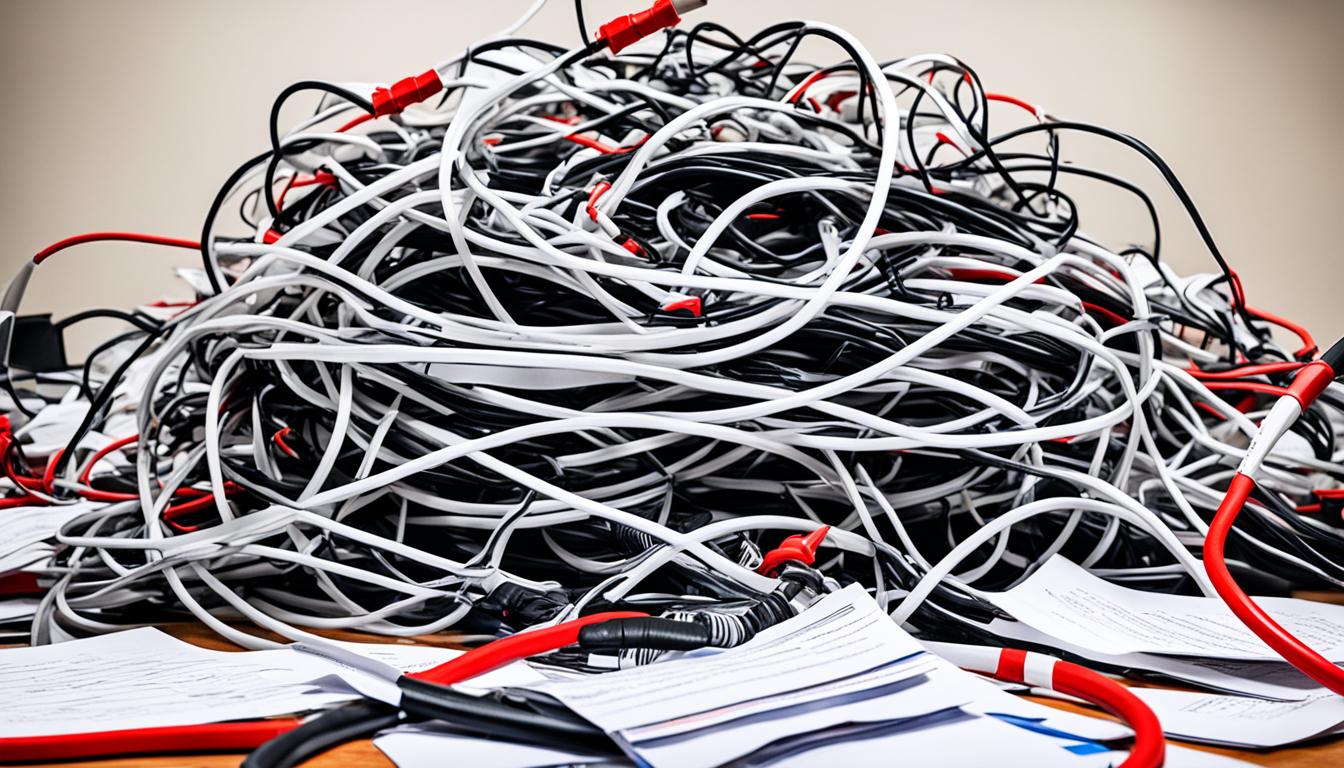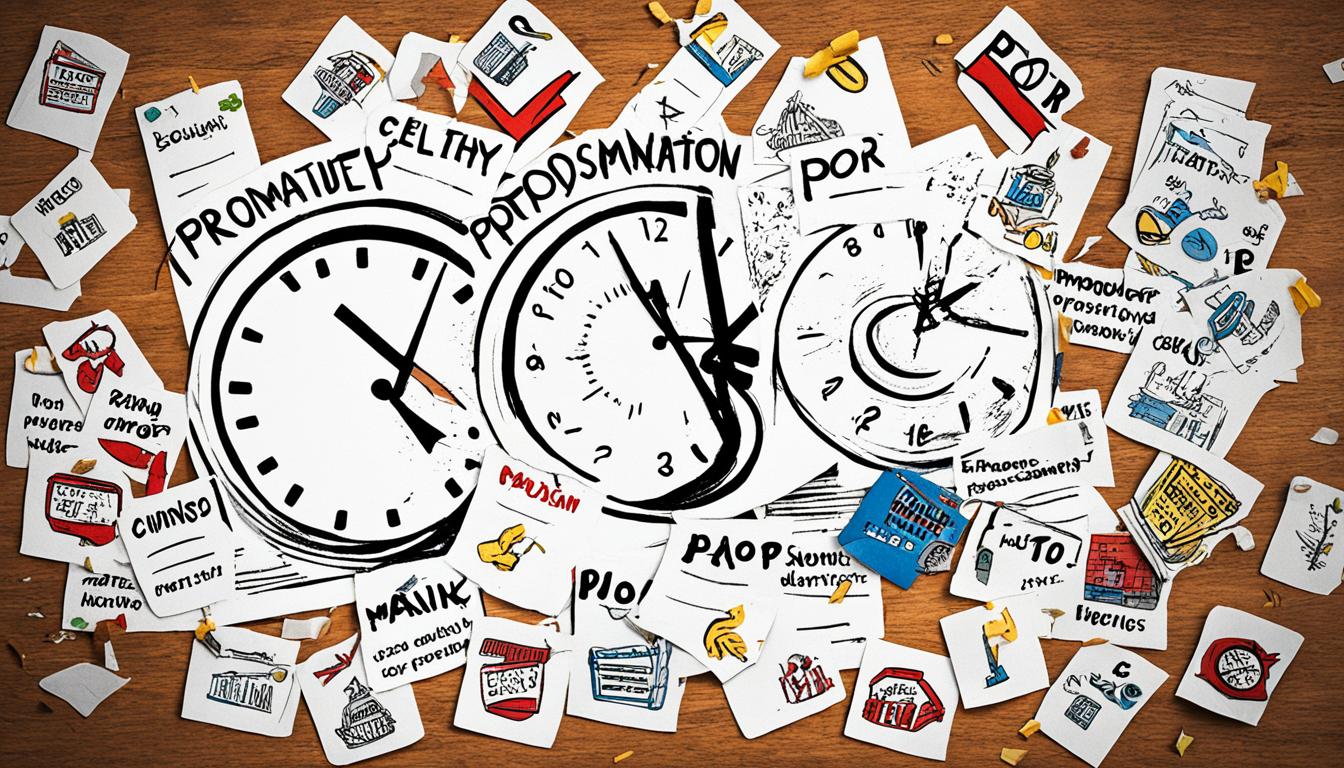A whopping 20% of U.S. adults are chronic procrastinators. They keep putting off tasks and decisions in many areas of life. Procrastination hurts productivity and happiness. It also harms mental and physical health. Knowing why we procrastinate is key to stopping it.
Poor decision-making often leads to putting things off. Bad choices make us doubt ourselves, causing more delay and indecision. Without making quick and smart decisions, we get stuck. This stops us from moving forward.
This inactivity is a big productivity barrier. It comes from fear and anxiety. When we delay decisions, small problems grow into big ones. This makes making decisions even harder.
Understanding how poor decision-making links to procrastination helps us see why we get stuck. It also shows us how to overcome indecisiveness.
Poor decision-making also limits our beliefs, misses big opportunities, and harms our goals. It risks our mental health too. Making better decisions can help us break free from chronic procrastination.

Key Takeaways
- Poor decision-making is a big reason for procrastination.
- Chronic procrastination hurts productivity and happiness.
- Good decision-making helps us overcome limits and reach our goals.
- Knowing the pitfalls of decision-making can stop procrastination.
- It’s important to balance quick and delayed decisions for better choices.
Poor Decision Making Creates Limiting Beliefs
Making poor decisions can really slow down our growth. Putting off choices can make us doubt ourselves. This doubt can turn into a cycle that hurts how we see ourselves and affects our work and life.
Reinforcing Negative Self-Perception
Not making decisions can make us see ourselves in a bad light. Studies show that fear of being judged stops many from making choices. This fear makes us think we can’t do things, causing more doubt.
Impact on Self-Efficacy
Believing in our ability to succeed is key. Research says many struggle to separate feelings from making decisions. This mix of feelings and choices can stop us from making important decisions, making us doubt ourselves more.
Cycle of Indecision and Delay
Indecision and delay can really hold us back. A study found that many leaders get stuck because they can’t decide fast. This problem affects us personally and professionally, making us fear failure and resist change.
To stop this cycle, we need to see how our beliefs and how we see ourselves affect our confidence. Facing these issues can help us make better choices and improve our mindset.
ReasonPercentageFear of decision outcomes20%Fear of making a necessary choice15%Fear of being a visible decision-maker30%Egotistical tendencies10%Organizational paralysis due to inaction25%Emotional entanglement in decision-making40%Fear of change12%
Knowing why poor decisions lead to putting things off helps us know what to work on. By tackling these issues, we can fight procrastination psychology and improve our personal and work life.
Blowing Life-Changing Opportunities
Procrastination stops us from grabbing big chances for growth, both at work and in life. About 20% of US adults put things off too much, more than those with clinical depression or phobias. This habit of waiting can really hurt your career and personal growth, leading to missed opportunities that could change everything.
Professional Misses
Studies show that putting things off can really hurt your career. People who can’t get things done on time often make less money and don’t stay in jobs long. They might miss out on important job chances or not take courses to improve their careers because they can’t decide.
ImpactDescriptionLower SalariesIndividuals who procrastinate tend to earn less than their non-procrastinating peers.Shorter Job TenuresChronic procrastinators often face shorter periods of employment.Higher UnemploymentProcrastination increases the risk of being unemployed or underemployed.
Personal Growth Stagnation
Not making quick decisions can stop you from growing personally. Studies show that putting things off can make you feel worse about yourself and control your actions. This can lead to missing out on building strong relationships, trying new hobbies, or improving yourself.
Not acting because you can’t decide often leads to regret and wondering what could have been. Research from Sweden links procrastination to health problems like sleep issues, headaches, and heart disease. This shows how putting things off can hurt your health.
Since procrastination has big effects on both work and personal life, it’s important to deal with it. Understanding why you do it and finding ways to stop can help you grab big chances for change.
Sabotaging Your Goals
Understanding how self-sabotage affects goal setting is key. Procrastination can be a way to cope, but it causes more harm. It stops us from moving forward.

Failure to Initiate Goal-Oriented Actions
Not starting actions towards our goals is a big part of self-sabotage. This can come from doubting ourselves, feeling bad about our worth, or having insecure attachments. People with low self-esteem might avoid trying to reach their goals.
This is especially true for students who struggle with staying focused and managing their time. They get caught up in distractions and put things off until the last minute. This hurts their grades and keeps them from reaching their goals.
Long-term Vision Compromised
Procrastination hurts not just now, but also our future goals. Putting things off leads to confusion and frustration. It makes it harder to live a fulfilling life.
About 20% of people deal with chronic procrastination, which affects their goals. At work, 40% of people say they often put things off. This slows down their career growth and lowers productivity.
Risking Mental Health
Procrastination can really hurt your mental health. It often leads to more anxiety and stress. This bad habit can make you feel more depressed and stressed out.
Increased Anxiety Levels
A study with 3,500 students over nine months found a link between more procrastination and more anxiety. When people procrastinated more, they felt more anxious. This shows how dangerous procrastination can be and why we should fight it.
Cycles of Guilt and Stress
Procrastination leads to feeling guilty and stressed. At the start, students scored about 12.9 in procrastination. Those who scored higher felt more guilty and stressed. This makes the problem worse and adds to anxiety and procrastination.
Emotional Coping Mechanisms
Trying to forgive yourself, practicing mindfulness, and being kind to yourself can help with procrastination. But, some people use bad ways to cope that make things worse. If you keep putting things off, your emotional health is at risk. About 20 percent of adults do this a lot.
Psychological FactorsAssociated RisksStatisticsAnxietyElevated Anxiety Levelsβ, 0.08; 95% CI, 0.04-0.12StressIncreased Stress Levelsβ, 0.11; 95% CI, 0.08-0.15GuiltStress Cycles-Emotional HealthRisk of Poor Emotional HealthHigher levels in chronic procrastinators
We need to understand how procrastination affects our mental health. It’s important for our emotional well-being and to stop the bad stress cycles. By dealing with procrastination, we can improve our mental health and live better lives.
Procrastination and Decision Making
Procrastination and making decisions are closely linked. One often leads to the other in a cycle. Studies show that procrastination hurts decision-making. It makes future efforts harder.

The fear of not knowing what will happen drives procrastination. It affects how we make decisions, making us choose short-term comfort over long-term gains. This fear leads to quick, not-so-great decisions, making procrastination worse.
Tim Urban shares insights on how changing how we see tasks can fight procrastination. By changing our minds and the brain’s reward system, we can make better decisions and procrastinate less. This shows how important self-reflection and controlling emotions are in beating procrastination.
Knowing how important a task is affects how likely we are to procrastinate. Tasks seen as very important often lead to more procrastination because of the pressure and fear of failure. About 20% of people struggle with procrastination, showing it’s a big issue.
Decision paralysis often leads to procrastination when we face many hard choices. This comes from negative feelings, getting tired from making decisions, and having too many options. Studies on saving for retirement and making medical decisions show this.
Procrastination DriverPercentage ImpactFear of UncertaintyHighTask Perceived ImportanceDirect CorrelationEmotional Control AbilitiesUniversal Impact
By tackling these issues and using strategies, we can make better, more thoughtful decisions. This can greatly cut down on procrastination and its bad effects. It helps us work better and make decisions in a healthier way.
Ruining Your Career Prospects
Chronic procrastination hurts your professional future. It lowers your work output and blocks your career growth.
Failure to Meet Professional Expectations
Not meeting work goals often comes from putting things off. This can be due to feeling anxious, depressed, or scared of failing. Or maybe you’re stuck on vague goals.
When you miss deadlines and don’t finish tasks, people at work start to doubt you. This is key for doing well in your job.
Impact on Job Security
Putting things off can make you do poorly at your job. If you’re always late and don’t do good work, you might lose your job. In a shaky job market, being reliable and productive helps you keep your job.
Stunted Career Advancement
Procrastination stops you from moving up in your career. Being indecisive and not acting keeps you from getting promotions and learning new skills. This means you won’t get into leadership roles and you’ll stay in the same place.
FactorEffects on CareerProcrastinationMissed deadlines, reduced quality of work, lower salariesAnxiety and DepressionDecreased productivity, compromised job securityIndecisivenessHindered promotions, fewer leadership rolesFear of FailureLack of initiative, missed opportunities
It’s key to fight procrastination to keep your career on track. This helps you avoid career barriers.
Lowering Self-Esteem and Confidence
Putting off tasks and decisions can really hurt your self-esteem and confidence. Studies show a strong link between procrastination and feeling less worthy. This can make you doubt yourself and avoid tasks, leading to more procrastination.

About 43% of people put off achieving goals and learning because of procrastination. The Procrastination Scale in education shows how big of a problem it is. It shows how procrastination can really hurt how you see yourself.
Low self-confidence in managing your time is a big reason for procrastination in students. This can make you less motivated and less confident. Procrastination leads to guilt and anxiety, hurting your confidence over time.
Procrastination can make you feel less confident, less energetic, and even depressed. Leaving tasks undone can make you feel overwhelmed. To fight this, try setting specific times for tasks, making decisions easier, and focusing on what you gain from finishing tasks.
Using rewards and daily routines can help you feel better about yourself and fight procrastination. People with high self-esteem see themselves positively and believe in their goals. They are more confident and efficient in what they do.
To overcome feelings of not being good enough, break tasks into smaller steps. Think about your past successes and make decisions with facts. This can help lessen the bad effects of procrastination on your self-worth and confidence.
Damaging Your Reputation
Putting things off can really hurt your reputation. It makes people see you as not reliable or trustworthy. When you don’t keep your promises, it hurts your personal brand and breaks trust. This leads to bad things happening in your life and work.

Loss of Trust
Not finishing tasks on time can make people lose trust in you. Colleagues, bosses, and clients start to think you’re not reliable. This loss of trust can stop you from growing in your job or personal life. Your bad reputation goes before you.
Negative Professional Image
Being late or not doing your best can make a bad impression at work. People might see you as not good with time or goals. This can hurt your job performance now and make it hard to move up in the future. Managers and employers don’t want to promote someone who always misses deadlines and makes poor choices.
To fix a bad reputation, you need to show you’re reliable and consistent. Being quick to act and taking responsibility can help you regain trust. In the end, beating procrastination is key to keeping a good work image and building strong work relationships.
Risking Physical Health
Procrastination can harm your health in big ways. It can lead to missing important health check-ups and exercise. This can make you more likely to face serious health problems. Studies show many people, like pre-service teachers, struggle with this.
Research links procrastination to health issues like insomnia and heart disease. Gustavson et al. (2017) found that genes and environment play a role in this. So, putting things off can make these health problems worse.
Not taking care of yourself can also be harmful. Eckert et al. (2016) found that better managing your feelings can help you stop procrastinating. This can lower stress and prevent headaches and heart problems.
“It’s not about having the time; it’s about making the time,” is a sentiment echoed by many who have successfully tackled health procrastination through proactive self-care strategies.
Malouff and Schutte (2019) showed that helping people stop procrastinating works. Breaking tasks into smaller steps and rewarding yourself for finishing them can help. This can lead to better health habits.
Procrastination can harm your health over time. Pychyl and Flett (2012) found that putting things off can lead to health issues. Taking action and being accountable is key to staying healthy.
To fight procrastination and protect your health, it’s vital to use good strategies. Taking care of yourself regularly and getting timely health care is crucial.
Conclusion
Poor decision-making is linked to procrastination. It affects both personal and professional growth. Putting off decisions can lead to missed chances and more stress. This can hurt your well-being and how much you get done.
Knowing how bad procrastination is helps fight it. Being mindful helps spot when you’re putting things off and understand your choices. Setting clear goals and breaking big decisions into smaller steps makes it easier.
Using strategies like thinking about the outcomes, setting deadlines, and getting advice from trusted friends can help. Looking back at past decisions helps improve future ones. These steps make making decisions on time easier. They help you grow personally and reach your goals.
Overcoming fears and being proactive in making decisions leads to action and reaching goals. This way, you can stop putting things off and start doing what you need to do.
FAQ
How does procrastination develop from poor decision-making?
Poor decision-making often leads to procrastination. People may avoid tasks because they fear failure or get stressed. This avoidance can make anxiety worse and make bad habits worse.
How does poor decision-making create limiting beliefs?
Bad decisions can make people doubt themselves and see themselves in a negative way. This can make them doubt their abilities. It can make them indecisive and procrastinate more.
How can procrastination lead to missed opportunities?
Putting things off can make people miss out on important actions. This could be applying for jobs or taking courses to improve their careers. Missing these chances can mean they miss out on personal or professional growth.
What are the consequences of procrastination on long-term goals?
Putting things off stops people from starting to work towards their goals. This can mess up their long-term plans and dreams. It can lead to feeling confused and frustrated, making it harder to live a fulfilling life.
How does procrastination affect mental health?
Chronic procrastination can make stress, anxiety, and guilt worse. This can hurt mental health. It can lead to bad ways of coping, making the cycle of procrastination and mental health problems worse.
What is the link between procrastination and decision-making?
Poor decisions often come from procrastination. People might make quick choices based on how they feel. This can make the procrastination cycle worse and lead to less than the best results.
How can procrastination harm career prospects?
Putting things off can lead to missing deadlines, not doing well enough, and not meeting what’s expected at work. This can make job security at risk, reduce chances for getting promoted, and stop career growth.
In what ways does procrastination lower self-esteem and confidence?
Doing things at the last minute can lower self-esteem and confidence. It creates a cycle of doubting oneself and avoiding tasks. This cycle can make someone feel worse about themselves and their abilities.
How does procrastination damage one’s reputation?
Putting things off can make people seem unreliable. It can hurt their reputation in both personal and work life. Always not following through can push people away, including colleagues, bosses, and friends.
What are the physical health risks associated with procrastination?
Putting things off can lead to not getting health check-ups, not exercising, and not taking care of oneself. This can increase the risk of sleep problems, heart diseases, and stress-related illnesses.

More Posts
Best Task Management Software for Individuals
Managing daily tasks, personal projects, and deadlines can be an overwhelming experience. Task management software for individuals provides a strategic solution to this modern challenge. Designed to streamline and simplify the organization of...
Top 10 Simple Tricks to be Productive When Working from Home
Working from home has its perks. The freedom of choosing your working hours and the ability to work from your favorite couch makes it a desirable experience. No more traffic. No worries about...
14 Factors to consider while purchasing a Task Management Software
Top 11 Contest Ideas for Employee Engagement
Employee motivation and engagement are crucial for fostering a productive and positive work environment. Introducing team building challenges can significantly boost morale and encourage a sense of camaraderie among employees. With over 73,930...